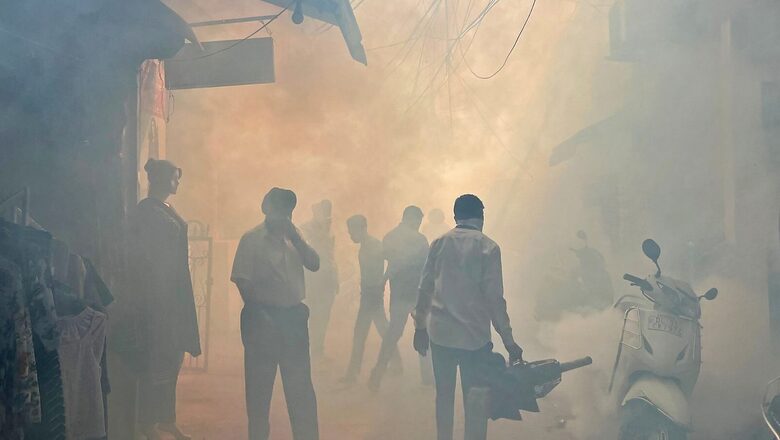
views
The air quality in Delhi deteriorated on Saturday as the AQI index reflected being in the ‘severe’ and ‘very poor’ categories at most stations. The AQI at Anand Vihar station reached a whopping 456, while Ashok Vihar saw the index at 422.
Pollution levels crept up on the night of October 23 amid a drop in temperature and wind speed and due to people bursting firecrackers and a rise in the number of farm fires. Since then, the air quality has remained mostly in the ‘very poor’ or ‘poor’ category, with little respite.
An AQI between zero and 50 is considered good, 51 and 100 satisfactory, 101 and 200 moderate, 201 and 300 poor, 301 and 400 very poor, and 401 and 500 severe.
The air quality on Friday had been in the ‘very poor’ category for the the fifth consecutive day, according to Central Pollution Control Board. The 24-hour average Air Quality Index (AQI) stood at 357 at 4 pm, improving from 365 at 4 pm on Thursday.
On October 19, the sub-committee of the Commission for Air Quality Management (CAQM) had implemented Stage II of the Graded Response Action Plan (GRAP) a set of anti-air pollution measures followed in Delhi and its vicinity according to the severity of the situation in the capital.
GRAP’s Stage II includes banning the use of coal and firewood in hotels, restaurants and open eateries. The use of diesel generators, except for essential services, is also banned.
GRAP is classified under four stages depending on the air quality in Delhi. Stage I in a case of ‘poor’ air quality (AQI 201-300), Stage II for ‘very poor’ air quality, Stage III for ‘severe’ air quality (AQI 401-450), and Stage IV for ‘severe plus’ air quality (AQI>450).
If the situation turns ‘severe’ (Stage III), authorities will enforce a ban on construction and demolition activities in the NCR, except for essential projects (such as railways, metros, airports, ISBTs and national security/defence-related projects of national importance).
24 Industrial Units Shut
The centre panel on air quality has issued closure orders to 24 industrial units in the NCR for grossly violating the air pollution-related statutes and guidelines since invoking the first stage of its Graded Response Action Plan (GRAP).
The measures were enforced in the National Capital Region (NCR) on October 5 by The Commission for Air Quality Management (CAQM) on October 6. Since then, a total of 472 incognito inspections have been carried out by the commission in industrial areas and construction projects across NCR and 52 grossly violating units and projects have been issued closure orders, CAQM said in a statement on Friday.
“Closure orders have been issued to 24 grossly violating industrial units. Of these, 05 industrial units were still found using coal and other unapproved polluting fuels,” the CAQM said.
With inputs from PTI
Read all the Latest India News here




















Comments
0 comment